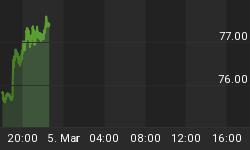Apart from the obvious financial distress that the current economic crisis has inflicted on most Americans, perhaps one of the more irksome byproducts of the meltdown has been the inescapability of clueless economic blather. It's bad enough when so-called economists serve up the same Keynesian nonsense that has led us down the current cul-de-sac in the first place. At least those people have some incidental knowledge, however deeply flawed, of basic economic concepts. It's far worse when political pundits, whose understanding of economics typically comes from Treasury Department talking points, hold forth as if they really know what is going on.
Last weekend I happened to watch the McLaughlin Group, a mainstay of Sunday morning political programs, which included a discussion that typified the lack of economic common sense that is so pervasive in our country. The program's anchor John McLaughlin, undoubtedly an expert in political maneuvering and Washington horse-trading, offered viewers his assessment of the global economic landscape. McLaughlin identified China, Germany, and Japan as being prime offenders in the global economic meltdown. Their "offense" was that they ran persistent trade surpluses, had savings rates that were "far too high" and consumption rates that were "far too low". McLaughlin identified these sins as responsible for the global economic imbalances. He urged the governments of those countries to adopt policies that would encourage their consumers to borrow and spend more. Exactly which school of economic thought informed his assessment is not entirely clear.
In the first place, if the creditor nations of the world actually follow Mr. McLaughlin's advice and become borrowers themselves, from just where does Mr. McLaughlin believe the money will come? These countries already lend to America. Does he think that they also have enough leftover to lend to themselves? Does he believe that America, which is tens of trillions of dollars in debt, has enough excess savings to lend? Perhaps he's eyeing the Martians' accumulated savings? The point is: the entire world cannot borrow at the same time. Someone has to do the lending. The only reason Americans are able to borrow so much is that those "offending nations" are loaning us the money.
Mr. McLaughlin apparently believes that if those countries simply adopted policies to encourage more consumption, America would then be able to export more products. Just what American-made products does he expect the Chinese to buy? If China did spend more, which they ultimately will, they would simply buy more of their own products that they currently ship to us. After all, if Americans are not buying American-made products, why would the Chinese? In most cases, it's not that consumers do not want to buy American products it's just that there are so few American-made products that are competitive in the global marketplace.
One guest on the panel did try to correct Mr. McLaughlin by suggesting that Americans needed to save more and spend less, but he was quickly shot down. Why should we spend less, McLaughlin snapped, when they could shoulder some of the burden by spending more? The inference here is that we are doing our part by lugging home shopping carts full of consumer goods, while they are getting off easy by spending their days in muggy factories making the goods!
What he fails to understand is that nothing can be bought that is not first produced. We cannot all just decide to spend our troubles away. It is only because the "offending nations" are producing surplus goods (meaning more goods than they are themselves consuming) that those goods are available to Americans. In McLaughlin's America, and indeed Obama's, we would all be standing around empty shelves with wheelbarrows full of worthless cash.
If the creditor countries are indeed the offenders, it is only in the sense that they have enabled us to live beyond our means and have facilitated the growth of our phony economy. However if they do as Mr. McLaughlin suggests, the immediate impact on the American economy will be much different than what he expects: the dollar will collapse, both consumer prices and interest rates will rise sharply, and the current recession will deepen. Rather than holding us back, foreign creditors have actually been propping us up. As for Mr. McLaughlin, he should stick to his strong suit: the dissection of political posturing. To presume a level of economic understanding by listening to self-interested politicians and academics is to invite catastrophe.
For a more in depth analysis of our financial problems and the inherent dangers they pose for the U.S. economy and U.S. dollar, read my just released book "The Little Book of Bull Moves in Bear Markets." Click here to order your copy now.
For a look back at how I predicted our current problems read my 2007 bestseller "Crash Proof: How to Profit from the Coming Economic Collapse." Click here to order a copy today.
More importantly, don't wait for reality to set in. Protect your wealth and preserve your purchasing power before it's too late. Discover the best way to buy gold at www.goldyoucanfold.com. Download Euro Pacific's free Special Report, "Peter Schiff's Five Favorite Investment Choices for the Next Five Years", at http://www.europac.net/reports.asp. Subscribe to our free, on-line investment newsletter, "The Global Investor" at http://www.europac.net/newsletter/newsletter.asp. And now watch the latest episode of Peter's new video blog, The Schiff Report, at http://www.europac.net/videoblog.asp.















